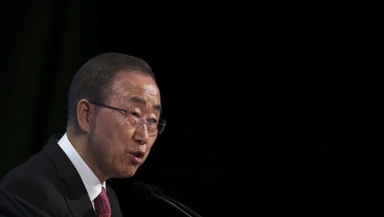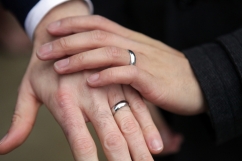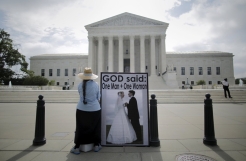
The United Nations is urging countries to prioritise LGBT rights and to include abortion as part of its grand plan to tackle the so-called global humanitarian crisis.
In the latest U.N. report "One Humanity: Shared Responsibility," which will be the basis for discussions between governments at the World Humanitarian Forum in Istanbul this May, U.N. Secretary General Ban Ki-moon asked governments to include abortion and LGBT rights in their efforts to tackle the humanitarian objectives of Sustainable Development Goals, a massive new 15-year U.N. development plan adopted by the General Assembly last year, LifesiteNews reported.
Ban, who is now in his final year as Secretary General, said "priority must be given to providing women and adolescents with comprehensive sexual and reproductive health services without discrimination."
"Countries have a 'core' obligation to prohibit discrimination on the basis of "sexual identity," he said.
He also underscored the need to include abortion as an option for women, adding that "providing abortion is an obligation under humanitarian law and the laws of war."
Last year, U.N. member states blocked any reference to sexual orientation and gender identity during the negotiations on the goals. They also rejected language that might be interpreted as including LGBT rights.
In the new U.N. goals, reproductive health refers back to a landmark 1994 U.N. agreement on population and development that expressly rejected any right to abortion under any circumstance and "only permits abortion in U.N. programming where it is legal."
Legal experts have likewise rejected the claim that abortion is a right under humanitarian law.
Meanwhile, diplomats blasted the U.N. human rights chief this week for demanding countries to legalise the killing of unborn babies with disability as a response to the Zika virus which has afflicted many countries.
Commissioner Zeid Ra'ad Al Hussein said in early February that countries affected by the Zika virus must loosen up or repeal pro-life laws on women's reproductive rights.
In countries where "sexual and reproductive health services are criminalised, or simply unavailable, efforts to halt this crisis will not be enhanced by placing the focus on advising women and girls not to become pregnant," Zeid said.
She added: "Women should be able to have an abortion if they want."
The Vatican described the call of the Human Rights Commissioner's to liberalise abortion laws as an "illegitimate response."
"Children with birth defects deserve to be protected and cared for throughout their lives, in accordance with our obligation to safeguard all human life, healthy and disabled, with equal commitment."
Nicaragua also rejected the call for abortion, particularly directed at developing countries.
"We cannot allow this epidemic to be manipulated to force countries" to "change laws on the right to life," a Nicaraguan government statement said.



















